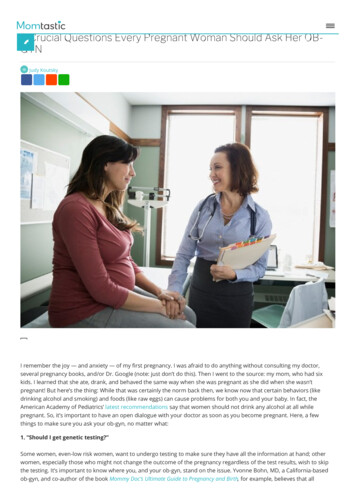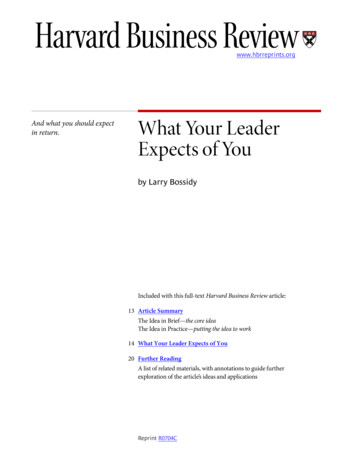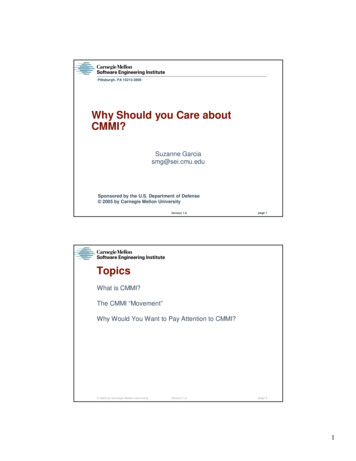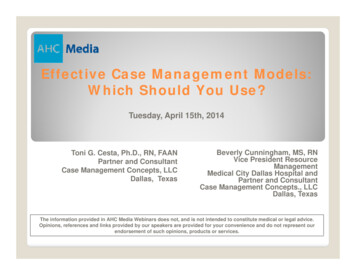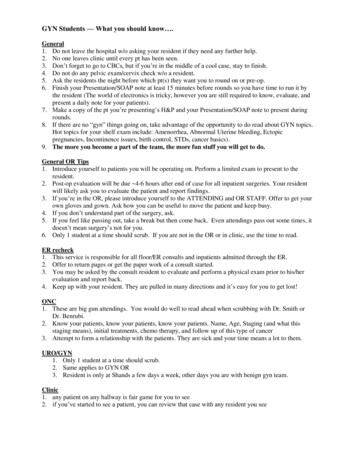
Transcription
GYN Students — What you should know .General1. Do not leave the hospital w/o asking your resident if they need any further help.2. No one leaves clinic until every pt has been seen.3. Don’t forget to go to CBCs, but if you’re in the middle of a cool case, stay to finish.4. Do not do any pelvic exam/cervix check w/o a resident.5. Ask the residents the night before which pt(s) they want you to round on or pre-op.6. Finish your Presentation/SOAP note at least 15 minutes before rounds so you have time to run it bythe resident (The world of electronics is tricky, however you are still required to know, evaluate, andpresent a daily note for your patients).7. Make a copy of the pt you’re presenting’s H&P and your Presentation/SOAP note to present duringrounds.8. If there are no “gyn” things going on, take advantage of the opportunity to do read about GYN topics.Hot topics for your shelf exam include: Amenorrhea, Abnormal Uterine bleeding, Ectopicpregnancies, Incontinence issues, birth control, STDs, cancer basics).9. The more you become a part of the team, the more fun stuff you will get to do.General OR Tips1. Introduce yourself to patients you will be operating on. Perform a limited exam to present to theresident.2. Post-op evaluation will be due 4-6 hours after end of case for all inpatient surgeries. Your residentwill likely ask you to evaluate the patient and report findings.3. If you’re in the OR, please introduce yourself to the ATTENDING and OR STAFF. Offer to get yourown gloves and gown. Ask how you can be useful to move the patient and keep busy.4. If you don’t understand part of the surgery, ask.5. If you feel like passing out, take a break but then come back. Even attendings pass out some times, itdoesn’t mean surgery’s not for you.6. Only 1 student at a time should scrub. If you are not in the OR or in clinic, use the time to read.ER recheck1. This service is responsible for all floor/ER consults and inpatients admitted through the ER.2. Offer to return pages or get the paper work of a consult started.3. You may be asked by the consult resident to evaluate and perform a physical exam prior to his/herevaluation and report back.4. Keep up with your resident. They are pulled in many directions and it’s easy for you to get lost!ONC1. These are big gun attendings. You would do well to read ahead when scrubbing with Dr. Smith orDr. Benrubi.2. Know your patients, know your patients, know your patients. Name, Age, Staging (and what thisstaging means), initial treatments, chemo therapy, and follow up of this type of cancer3. Attempt to form a relationship with the patients. They are sick and your time means a lot to them.URO/GYN1. Only 1 student at a time should scrub.2. Same applies to GYN OR3. Resident is only at Shands a few days a week, other days you are with benign gyn team.Clinic1. any patient on any hallway is fair game for you to see2. if you’ve started to see a patient, you can review that case with any resident you see
3. if you see residents busy and you don’t have anything to do, ask if there’s something you can helpwithGeneral Topics to Read1. Dysmenorrhea / Pelvic Pain2. Birth control options and contraindications (breast feeding, med problems, etc).3. Dysfunctional Uterine Bleeding (DUB)4. Fibroids5. Ovarian, Endometrial, Cervical Cancers (and HPV)6. Pelvic Inflammatory Disease7. Incontinence
Remember that all electronics were preceded by paper notes!!!You are still learning. These are the important aspects of these evaluations and documentation.Pre-op NoteIf previous H&P more than 30 days old, need to do full H&PS: major complaint inciting need for surgeryO: vitalsBrief exam including general, heart, lungs, abd (with scars), extHgb, and any other labs or imaging related to perioperative morbidityA/P: 31yo G3P3 with symptomatic pelvic organ prolapse for TVH with A & P repair.Risks, benefits, alternatives discussed. Consents signed.Plan for ovaries.Op NotePre-Op Dx:Post-Op sition:Post-Op NoteS: ?pain control, ?voiding, ?ambulating, ? flatus, ?dietO: vitalsBrief physical including general, heart, lungs, abd (bowel sounds, tenderness), incision (undo dressingPOD#1 and leave it undone until resident has seen it), ext (focus on signs of DVT, document SCDs)Urine output and post op hgbA/P: 31yo G3P2 POD#1 s/p TAH/BSO LOA for fibroids1. post op - doing well, d/c foley, ambulate, incentive spirometry, d/c PCA, advance diet2. htn - will restart po meds3. anemia - asx, will transfuse if necessary
University of FloridaCollege of Medicine - Jacksonville3rd Year Medical Student Ob-Gyn ClerkshipDivision of Gynecologic OncologyAuthors:Karl Smith, MDJohn Martino, MS3What is Gynecologic Oncology (Gyn-Onc)?Gynecologic Oncology is a subspecialty of Ob-Gyn. The other two Ob-Gyn subspecialties are MaternalFetal Medicine (High risk Obstetrics, MFM) and Reproductive Medicine (Endocrine and Infertility).Certification in Gyn-Onc requires training and board certification in Ob-Gyn and then 2-4 years offellowship training in Gyn-Onc. Gynecology Oncologists are involved in the diagnosis, staging, treatmentand follow-up of women with cancer of the female reproductive tract. Gynecology Oncologists managenew cancers, recurrences, complications, and end of life care. Unlike other oncology disciplines, GynOnc deals with all treatment modalities in a specialized area rather one modality for the entire body suchas Medical Oncology and Radiation Oncology. Gynecology Oncologists are versed in surgery, radiationtherapy, and chemotherapy. Most Gynecology Oncologists do not manage breast cancer.What we expect in a week on the Gynecologic Oncology Service:At the end of this week you should know what diseases are managed by Gyn-Onc and have somefamiliarity with gynecology cancer diagnosis, staging, and treatment. Regardless of what area of medicineyou eventually go into, we want you to know who to call if you encounter a patient with a suspectedgynecology cancer problem. We do not expect you to become an expert in gynecology cancer, but as aresult of your experience, we do expect you to become a better physician.Attendings and Residents on the service:Division Director: Karl Smith, MDGynecology Oncologist and Ob-Gyn Department Chairman: Guy Benrubi, MDGyn-Onc Chief Resident: PGY4Gyn-Onc 2nd Year Resident: PGY2Key places at Shands Jacksonville: 3 South - Nursing Unit where most Gyn-Onc patients will be located ACC 3rd Floor – Clinic location- Gyn-Onc clinic meetings are on Thursday 8:30 a.m. until finished(usually about 12:30 p.m.)- See patients with a 2nd, 3rd or 4th year resident and present to attending Operating Rooms- Main OR – Main hospital building, 2nd Floor; Tuesday& Friday are Main OR days forOncology- Outpatient Surgery Center (OSC) – LRC Building (Faculty Clinic, 1st Floor)Learning Objectives:
Common Gynecologic Cancers – Cervical- Be able to recognize normal from abnormal cervix- Understand importance of HPV- Evaluation of abnormal Pap smears- Diagnosis and treatment of cervical dysplasia (cervical intraepithelial neoplasia)- Diagnosis, staging and treatment of invasive cervical cancer Endometrial- Who is at risk?- Evaluation of postmenopausal uterine bleeding- Management of endometrial hyperplasia- Diagnosis, staging and treatment of endometrial cancer Ovarian- Know basic types (epithelial, stromal and germ cell)- Who is at risk?- Understand evaluation process for pelvic masses- Diagnosis, staging and treatment of epithelial ovarian cancer Vulvar-Be able to recognize normal from abnormal appearing vulvaRecognize the vulvar inflammation from neoplasiaRecognize need for vulvar biopsyDiagnosis and treatment of vulvar dysplasiaDiagnosis, staging and treatment of vulvar squamous cancerLess Common Gynecologic Cancers – Vaginal Fallopian tube Trophoblastic Disease- Gestational- Non-GestationalOther Cancers of Special interest to Gyn-Onc – Breast Colon
Treatment Modalities – Surgery Radiation therapy- External beam (teletherapy)- Intracavitary (brachytherapy) Chemotherapy- Cytotoxic- Hormone therapy- ImmunotherapySpecial Issues – Learn pelvic anatomy Symptom management- Pain- Nausea and vomiting- Chronic fatigue- Clinical depression- Diminished activity Associated medical problems- COPD- Heart disease- Hypertension- Diabetes Mellitus- Obesity- HIV- Others Social issues- Lack of funding- Lack of housing- Lack of transportation- Non-Compliance
Guide to Free References for Gyn-Onc Students1. AccessMedicine by McGraw-Hill –http://www.library.health.ufl.edu/, http://www.uflib.ufl.edu/ufproxy.htmlThis website has dozens of McGraw-Hill’s textbooks available online for free through theUniversity of Florida Health Sciences Library website. The second link above is to the OffCampus Proxy access, which can be utilized through the Gatorlink username and password (whatyou sign into UF Webmail with). Once on the Health Sciences Library website, the “Databases”list can be accessed to view the numerous databases available through UF. This is where accessto PubMed, Clinical Pharmacology, UpToDate (which is not On Campus Only), and MD Consultcan be found. In the scroll bar on the bottom half of the screen, click on AccessMedicine, whichis the fourth database listed. This takes you to the AccessMedicine homepage. There aremultiple tabs at the top of the page that allow access to textbooks from many disciplines,pathology images, procedure videos, case files, explanations of different diagnostic tests, andeven Board Review material.2. New England Journal of Medicine, Procedure Videos –http://content.nejm.org/The NEJM has approximately 20 excellent basic procedure videos available that are central tomedical care. The videos can be accessed by scrolling down to the “NEJM Audio and Video”box on the right hand side of the screen. Clicking on “More Procedure Videos” will enableaccess to the downloadable videos. The NEJM website has many other excellent resourcesavailable for free.3. American College of Surgeons, Division of Education –http://elearning.facs.org/login/index.php/This is an excellent site for medical students and first year residents to learn basic surgical skillssuch as knot tying and use of basic surgical instruments. It has nice videos that are divided intothree different phases depending on your skill and knowledge level. It requires a free registration.On the homepage, click on “Create new account” on the right half of the screen. Once registered,click on the phase you wish to review, and then proceed through the videos listed.4. National Comprehensive Cancer Network –http://www.NCCN.org/This is an excellent online resource for clinical practice guidelines for many different types ofcancer. It presents information on cancers in an easy to follow format that includes clinicalpresentation, treatment options (surgical and medical), recurrence probabilities, staginginformation, and discussions. It requires a free registration. On the NCCN homepage, theClinical Practice Guidelines can be accessed by clicking on “NCCN Clinical Practice Guidelinesin Oncology” under the “Clinical Recommendations” column on the bottom half of the page. Thedocuments can be downloaded and/or printed from the website.5. Atlas of Pelvic Surgery –http://www.altasofpelvicsurgery.com/This is Cliff Wheelis’s gynecologic surgery book online. It has excellent diagrams and step-bystep approaches to numerous surgeries. All students on their Gynecology or Gynecology-Oncrotation should review these procedures prior to seeing them in the OR.6. ASCCP Colposcopy Course –ASCCP Colposcopy Course.docThis is a course prepared by the American Society for Colposcopy and Cervical Pathology thatprovides a quick guide to cervical anatomy, histology, and pathology. It also provides a guide tocolposcopy, which should be reviewed before seeing patients in the Colposcopy Clinic.7. Understanding Risks of Ovarian Cancer Pamphlet –http://www.wcn.org/downloads/Understanding Risk of Ovarian Cancer.pdf/Understanding Risk of Ovarian Cancer.pdfThis pamphlet is an excellent guide to identifying the risk of hereditary gynecologic cancers. It isprovided by the Gynecologic Cancer Foundation.
If there are no “gyn” things going on, take advantage of the opportunity to do read about GYN topics. Hot topics for your shelf exam include: Amenorrhea, Abnormal Uterine bleeding, Ectopic pregnancies, Incontinence issues, birth control, STDs, cancer basics). 9. The more you become a part of the team, the more fun stuff you will get to do. General OR Tips 1. Introduce yourself to patients .
